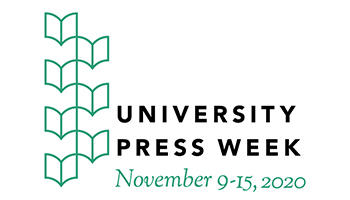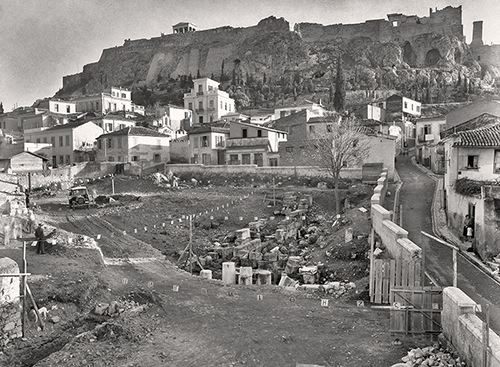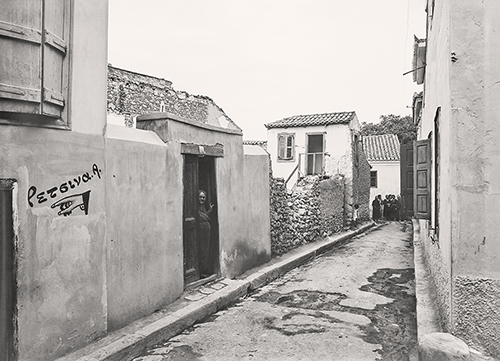ASCSA Publications Participates in University Press Week 2020
Every year, the Association of University Presses (AUPresses) organizes University Press (UP) Week to highlight the work of university presses and the impact their publications have on the world. The theme for UP Week 2020 is Raise UP, which celebrates the role that the UP community plays in elevating scholars, communities, and ideas. This year, ASCSA Publications is excited to take part in the UP Week blog tour with each day featuring the variety of voices that make up UP publishing. Today focuses on local voices, providing an excellent opportunity to celebrate the local Athenian voices of Vrysaki: A Neighborhood Lost in Search of the Athenian Agora.

Since the volume’s publication earlier this year, author Sylvie Dumont has received updates from the community as people continue to gather and share information about the neighborhood. In fact, younger Athenians and foreign scholars continue to be surprised when learning that the area was inhabited before the excavations. Sylvie explains, “When one is focused on the Greek and Roman remains, the more recent past is often overlooked.”

A view of section HH, one of the first areas excavated in the Agora, and the surrounding neighborhood.
Sylvie is still in contact with the sisters of a monastery in nearby Koropi, who had contacted her years ago in an attempt to locate the house of their Mother Superior, which used to stand in Vrysaki somewhere near the Church of Vlassarou. Sylvie was able to identify the house where the Mother Superior lived, and she was even able to provide them with a photo, albeit a blurry one. The nuns were very touched, and they continue to send Sylvie cookies and information about Vrysaki whenever they hear something. Recently, they told Sylvie about a silent movie, The Apaches of Athens, that was filmed in the center of Athens in 1930. As luck would have it, Sylvie was able to screen the recently restored film at the Byzantine Museum, where it was accompanied by a score performed by the National Opera of Greece. Sylvie says that watching the movie “was like walking into my book. The movie was filmed in Vrysaki itself, and one scene showed the interior of a house, accurately reproducing the frugality of the time.” Sylvie has been in contact with the Greek Film Archive, which undertook the restoration of this film, as her book provides a uniquely complementary perspective: both book and movie bring to life a neighborhood that no longer exists.

Ptolemaiou Street, September 1932, with the Church of Vlassarou visible in the background where a group of women are gathered.
Although Sylvie is not a native Athenian, she has embraced her local community. After studying classical archaeology at the University of Laval in Québec City, Canada, she moved to Greece in 1985 and has lived there ever since. She looks back on the time she has spent in Greece, musing “I never thought during my first visits to Athens that, in the end, what would touch me the most would be the lives of the people who used to live atop the Agora—their attachment to their neighborhood and their hardships. Writing this book was a wonderful way to understand the frame of mind of the inhabitants of Athens and the city’s historical development. I feel very privileged to be part of this city.”
It was the experiences with the people connected to Vrysaki that convinced Sylvie her book was an essential and worthwhile endeavor. It has been important to provide answers to the many questions asked by the people whose lives had been affected by the School’s appropriation. The value of her work continues to be reaffirmed after the book’s publication, and Sylvie hopes that people will feel the way local author Manolis Tasoulas feels about Vrysaki when he thanked her for taking him on a time traveler’s walk through the neighborhood.
Be sure to check out the UP Week Gallery, including over 80 works published by university and academic presses around the world, including our own Vrysaki: A Neighborhood Lost in Search of the Athenian Agora.

ASCSA Publications is proud to be a member of the Association of University Presses (AUPresses). AUPresses is an organization for the community of university and academic publishing professionals and institutions. Their purpose is to advance the essential role of a global community of publishers whose mission is to ensure academic excellence and cultivate knowledge. Their core values include intellectual freedom, integrity, stewardship, and diversity and inclusion. You can learn more about AUPresses, their mission, and their core values on their website.